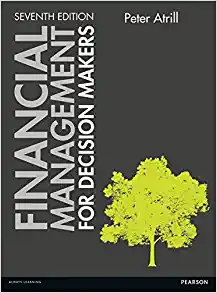Question
Once a price was set, it was almost impossible to raise it, and in many cases prices fell over the life of an item. Johnson's
Once a price was set, it was almost impossible to raise it, and in many cases prices fell over the life of an item. Johnson's first major decision as head of Key West Electronics was whether or not to authorize production of a new memory expansion system (MES). This system, as proposed, would expand the memory and capability of a wide range of computer platforms. Based on an initial evaluation, it appeared the product would offer significant profits over its expected six-year life. It was known that none of the major manufacturers had plans for development of similar products and only Allied had the potential for development and marketing of a competing product. If successful, the new line, would lead Key West into a period of sustained profitability. Data on the proposed system is shown in the following table:
ITEM ESTIMATE
Plant Cost $60 Million
Life 6 Years
Tax Rate 40%
Salvage 0
The initial evaluation of MES indicated that the investment in specialized machinery and other production-related areas would cost $60 million after recognition of investment tax credit. Because of the losses in the past, the equipment would be depreciated on a straight-line basis rather than MACRS, and it was estimated that at the end of the project, while still usable, would have no economic use and be scrapped at a net salvage of zero. The applicable tax rate for the project would be 40 per cent, and Johnson had recently decreed that no investment project would be undertaken if it did not produce at least a 16 percent rate of return on the after-tax cash flows. In keeping with his concern about risk, Johnson had asked for a risk assessment on the project. It turned out that the uncertainty in the project revolved around three areas: market size, market share, and cost of production. Excerpts from the project proposal concerning risk were as follows.
The market size is expected to be either $300 million or $200 million each year for the next six years
In terms of competition, the major uncertainty is whether or not Allied will bring out a competing product at the same time as the introduction of the Key West Electronics MES line. Based on the current competition, it would appear that in the absence of Allied coming into the game, our market share would be 30 per cent for each of the next six years. In the event that Allied does introduce a product, that product would take 10 points from our share and leave us with 20 per cent of the market for the next six years. Our estimate is that the probability of this occurring is 50 per cent.
The production of the MES will require a costly manual assembly process. There is an automated system that can be licensed but may not work for the quantities that are needed. In the absence of that system the estimate is that costs, exclusive of depreciation, will be 70 per cent of sales. If the new production system can be used the will be reduced to 60 per cent of sales. Our estimate is that the probability of the system being applicable is 50 per cent. There are no savings in the initial outlay, because our cost of the new system is based solely on our use of it.
The probabilities in the above report appeared as a direct result of a specific request by Johnson. He wanted risk taken into account in all capital projects and had developed the following criteria for any project to be acceptable.
The NPV of the expected value of the after-tax cash flows had to be positive at the 16 per cent discount rate.
The NPV of the cash flows, using the worst case had to be no less a loss than 20 per cent of the project outlay.
Case Questions:
1. Compute the net cash flows for year's 1-6 using the expected-value concept.
2. Compute the NPV on the expected value of the net cash flows.
3. Compute the net cash flows for the worst-case scenario.
4. Compute the NPV on the cash flows for the worst-case scenario.
Step by Step Solution
There are 3 Steps involved in it
Step: 1

Get Instant Access to Expert-Tailored Solutions
See step-by-step solutions with expert insights and AI powered tools for academic success
Step: 2

Step: 3

Ace Your Homework with AI
Get the answers you need in no time with our AI-driven, step-by-step assistance
Get Started


